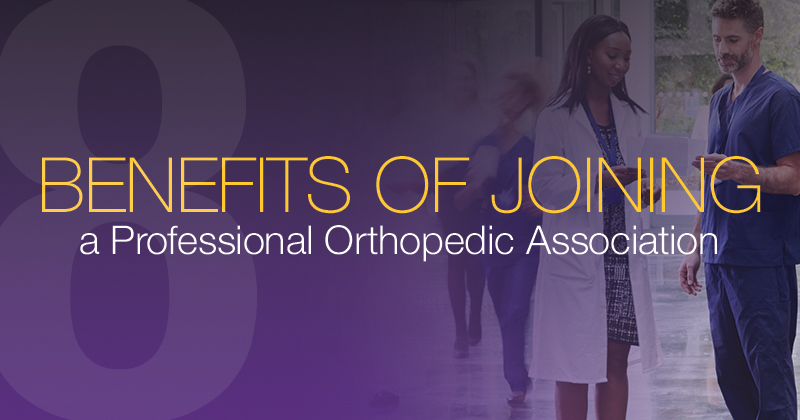Eight Benefits of Joining a Professional Orthopedic Association

New surgical technique? Advocacy? Orthopedic EMR lessons? Why an orthopedic association may be worth the dues
Options. You have a plethora of them when it comes to selecting and joining a professional orthopedic association. Maybe you’re interested in joining an international group with thousands of members, or perhaps your interest lies with smaller associations for surgical subspecialties. Some associations even focus on orthopedic practice executives and managing both the clinical and business operations. Individual states and geographic regions have their own orthopedic associations as well and can provide a great way to network and learn closer to where you live and practice. The list below includes some examples of well-known professional orthopedic associations.
- American Academy of Orthopedic Surgery (AAOS)
- American Association of Orthopedic Executives (AAOE)
- North American Spine Association (NASS)
- American Orthopedic Society for Sports Medicine (AOSSM)
- American Association of Hip and Knee Surgeons (AAHKS)
- State and Regional Societies
This list is not exhaustive and there are many more options to choose from. Whether you decide to join one or multiple organizations based on your interests and career path, many orthopedic surgeons have reaped the benefits of membership. Outlined below I have included eight reasons to become an active orthopedic association member.
1. Continuing Medical Education Credits (CMEs)
Orthopedic surgeons need to earn CMEs regularly and most professional orthopedic associations offer a variety of courses for their members. Associations offer education on a broad range of topics such as surgical techniques and indications, orthopedic billing and coding, healthcare compliance, orthopedic revenue cycle management, MIPS reporting and new treatment options. Not only that, they utilize multiple platforms like webinars, self-directed online courses, in-person workshops and annual conferences that provide flexibility to learn in a format that best fits your lifestyle. Often times, the association will offer discounted or free course fees for its members, and these savings can quickly cover the cost of dues.
2. Professional Development
Professional development goes beyond simply collecting the annual required CMEs by helping to keep you informed and competitive in your orthopedic practice. By learning about new surgical procedures for ankle reconstruction or more efficient ways to process claim denials or streamline office operations with orthopedic software, you have the potential to enhance patient care and maybe even improve the financial performance of your practice.
Many professional orthopedic associations also offer online resource centers, for example with job openings available exclusively to their members. You could find the orthopedic practice administrator with the qualifications and experience your practice needs or you may even find the perfect opportunity for a new position that you have been waiting for. Plus, many associations include postings for available office space or volunteer positions locally or abroad. The insights, networking and opportunities provided can give you the competitive edge you need to make the next step of your career path.
3. Professional Networking
Events and communication platforms offered by professional orthopedic associations create opportunities to interact and network with others in your field both nationally and internationally. Annual conferences and workshops help members from different geographic locations, practice types, roles and experience levels to come together. You’ll meet other like-minded professionals that you may have never crossed paths with, and reconnect with former classmates and colleagues. Orthopedic conferences and events provide the arena to hear from and meet renowned thought leaders in the orthopedic field that may be speaking or instructing.
In the digital age, most professional orthopedic associations also have active online communities and message forums that provide an interactive exchange for members to ask questions, discuss relevant topics, share resources and create special interest groups. Topics can range from what’s the best orthopedic EHR, to new advancements in total joint arthroplasty, to orthopedic billing and ICD-10 coding updates and more.
Some associations even offer mentorship programs that officially pair members with industry experts. These mentors can help guide you in your professional growth or assist when it comes to a challenge your orthopedic practice may be facing.
4. Industry and Orthopedic Vendor Guidance
As a member of an association, you could be among the first to find out about new products and services from healthcare vendors that may help to improve your patient care and orthopedic practice management. With so many options to choose from, researching a new orthopedic EMR solution or sports medicine implant company can feel overwhelming. Associations will often offer online or in-person resources to provide their members information on vendors relevant for orthopedic practices to help them narrow down their search. You may even be able to find other orthopedic practices that have experience with the specific products you’re considering to gather feedback. Annual conferences and workshops usually have exhibit halls where orthopedic healthcare vendors can provide education or a live demonstration of their products and services to help you make a well-informed decision. And oftentimes regularly scheduled association lunches or dinners are sponsored by vendors. While they want to network with you, they may also provide valuable guidance on a challenge you may be facing.
5. Advocacy
Many physicians find advocacy – the nonprofit version of lobbying – a key benefit of membership. The connections with regulators, legislators and health insurance payers that influence the healthcare industry can be mutually beneficial. As a member, you can learn about and advocate for issues that impact the clinical and business functions of your orthopedic practice. Elected officials have the advantage of learning from experts about the issues their constituents face. Associations provide a platform that gives us a stronger collective voice locally, across the state or nationally. As value-based medicine evolves there is an absolutely critical need to maintain a strong platform for advocating our specific orthopedic needs in Washington.
6. Patient Education Tools
As you know, educating patients about their injury or disease is a critical part of helping to ensure successful treatment, and they need tailored educational materials. Associations sometimes provide printed and electronic patient-facing materials on common orthopedic conditions and procedures. These resources can help make your patients feel more comfortable and help ensure they do their part during the treatment and healing process. For example, the American Association of Hip and Knee Surgeons provides patient with educational materials regarding what to expect before and after joint replacement surgery.
7. Increase Practice Exposure
At the end of the day, an orthopedic practice is a business. Attracting patients from your local community requires getting the word out. Many associations provide marketing and public relations tools such as radio advertising templates, press release templates, community health presentations, patient brochures and practice website creation tools. These marketing resources can help you connect with potential patients and share your expertise in your community. Plus, donating your time to a related charity can not only provide exposure but also create goodwill.
8. Promote and Support Orthopedic Research
Most professional orthopedic associations provide resources to support medical research that contributes to the advancement of knowledge and treatment of diseases, injuries and disabilities that affect orthopedic patients. These resources can include clinical publication libraries, member surveys, laboratory access, research fellowships, research grants and funding. With the contacts you make, you can collaborate on cutting-edge orthopedic research projects. In this day and age, multi-institution based research is more important than ever as we strive to provide data that shows the value orthopedic surgery brings to society.
Learning is a life-long process and joining orthopedic associations can help provide the right forum for you to take advantage of educational and networking opportunities to help propel your career. Search online, talk with peers and attend conferences to see what associations match your career goals.





